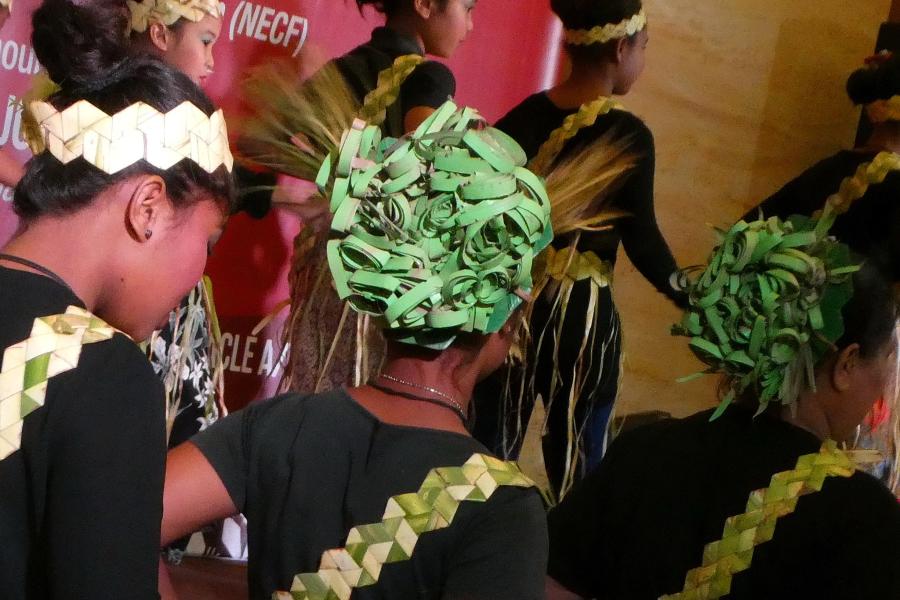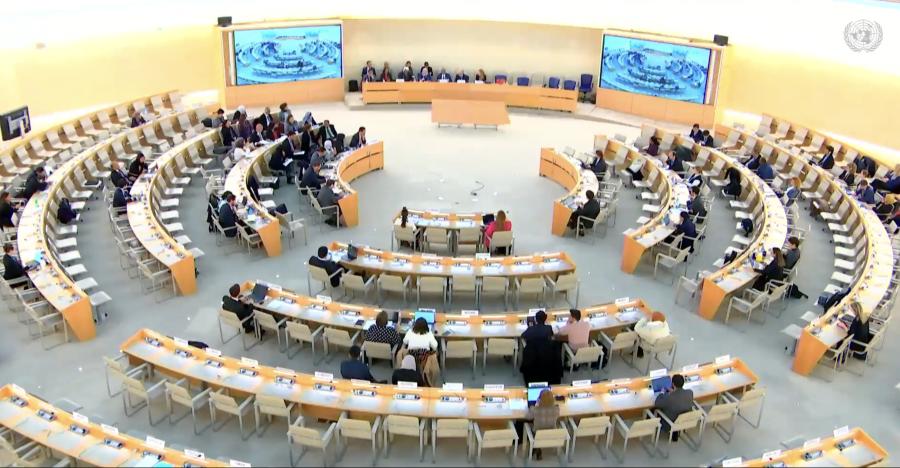KUCHING, Sarawak, Malaysia, August 28, 2009 (ENS) - Penan tribespeople armed only with blowpipes and spears have erected blockades across the roads cut by logging companies into their forest in the Malaysian state of Sarawak on the island of Borneo. The blockaders want an end to logging on their lands.
In particular, the Penan aim to stop planned plantation projects. Where the valuable trees have logged out, the companies are starting to clear the land for oil palm, acacia and eucalyptus plantations. Palm oil is used in many foods and cosmetics, and increasingly for biofuels.
The British charity Survival International and the Swiss Bruno Manser Fund are calling for recognition of the hunter-gatherer Penan tribe's land rights and a halt to all development on their land without their consent.
|
|
Penan armed with blowpipes block road as Shin Yang logging trucks approach. (Photo courtesy Survival International) |
Malaysian police are at the blockades, but no arrests have been reported.
Today, Penan leaders are refusing to meet a Sarawak government delegation at the proposed meeting point in Long Bedian, a Kayan long-house in the Tutoh River region. According to Penan sources, the meeting is to take place today.
Long Bedian is a regional centre for the Apoh-Tutoh region, which is strongly influenced by the presence of several logging companies.
"We are open for talks with the government, but we refuse the proposed meeting point at Long Bedian," a Penan spokesperson told the Bruno Manser Fund, a Swiss-based nonprofit named after the late environmental activist who dedicated his life to justice for indigenous people.
The Penan said they feel humiliated by a statement of Abang Johari, the former Sarawak Minister of Penan affairs and current Minister of Housing, who alleged in "The Borneo Post" that foreigners are behind the logging road blockades.
"We expect the official delegation to meet us at the blockade sites or at a Penan village," the Penan spokesperson said. "It is essential for the officials to see the dire situation of our villages with their own eyes and to hear the voices of our people."
On August 20, Penan of three communities - Long Nen, Long Bangan and Long Belok - set up the road blockades to prevent vehicles from logging and plantation companies from entering their native lands.
According to Penan sources, four policemen visited the blockades on Sunday and announced that they would come back with more of their colleagues to dismantle them. The blockades are mainly directed against Pusaka KTS and Samling, two Malaysian logging and plantation giants.
Both companies have been logging the Penan's forests for over 20 years and have been granted licences to convert large tracts of the Penan's lands into oil palm and acacia plantations.
|
|
Penan man demonstrates use of a blowpipe. (Photo by Jonathan Merritt) |
The Penan have continuously resisted the companies' operations, and the companies were only able to gain access to their lands after armed police broke up a road block and arrested dozens of villagers back in the late 1980s.
Until recently, the Penan have been living in the rainforests of Borneo as Southeast Asia's last nomadic hunter-gatherers. Most of them have settled in villages but still depend on the forest for their livelihood.
The Sarawak government refuses to recognize the Penan's land rights and has ignored a call by the Malaysian human rights commission, Suhakam, to recognize the Penan's land claims.
A coalition of Malaysian indigenous rights organizations has recently called for a moratorium on new plantations due to the land conflicts between indigenous communities and the government.
Survival International Director Stephen Corry said, "The logging and oil palm companies are robbing the Penan not just of their forests but of their food and water. It is essential that the Malaysian government recognizes the Penan's rights to their land and stops allowing the companies to take everything in sight."
According to Malaysian law, indigenous peoples claiming land rights must submit evidence that they were already using the land before 1958. For a hunter-gatherer culture with no written records, that is difficult, but not impossible.
The Bruno Manser Fund is supporting the Penan with modern equipment so they can produce maps to document the use of their lands and the borders of their territories. The mapping is done by using global positioning system devices. Trained mapping teams from various villages input the data about communities' borders and cultural sites, such as graves, abandoned settlements and hunting grounds.
This data is transferred to maps and compared with satellite images. The maps now indicate where the logging companies have cleared roads into the Penan primeval forest and where the forest is still intact.
In a judgment regarded as setting a precedent in 2001, a court in Sarawak ruled that it was possible for indigenous land rights to include forest territories too. This has given the Penan grounds for hoping that their claims will be recognized.


